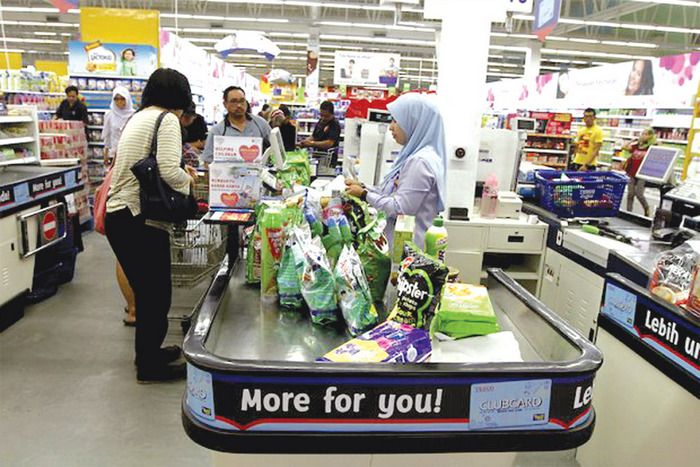

Cover Story
By Ili Aqilah
Ask any Malaysian and they will agree that the hike in prices on groceries and GST charges are two primary factors that create hardships in their lives. Before the implementation of GST, dining out used to be cheaper but nowadays, some restaurants would even charge GST on each menu item and when the bill comes, pay a further 10 per cent for service.
Many now opt to cook at home, buying raw materials such as meat, vegetables and seafood at the market. While this certainly saves money, it is hard to deny how much the prices on groceries have increased over the years. Hence the question remains, with the rising cost of living, how much can we save?


Ringgit’s Drop – Everyone’s Worst Nightmare
According to Bloomberg Market’s website reports, on November 2016 the Malaysian Ringgit value dropped to its lowest since 1998. There are many reasons that contributed to the drop including the recent U.S. election, where Donald Trump was elected the 45th president after Barack Obama and also the alleged 1MDB scandal that involved some top people in the corridors of power.
How does the drop in value of the Ringgit affect grocery items? With the weakened value of the Ringgit, there are higher import costs. Retail sectors such as restaurants, fashion boutiques, furniture stores, electrical and electronic goods and grocery stores are directly affected.
Property


“It is affecting the market. Banks are tightening their loans so property sales are slower. However, buyers should take advantage of the purchasing power they have now. Do your research and go for developer packages as they have rebates and freebies. It is definitely better to buy now because once the economy goes back to being slightly more stable, you will miss out on all these deals and such,” said Natasha Gideon, 27, a real estate negotiator at Zerin Properties.
Natasha added that the dropped value of the Ringgit has different effects for different investors. While some are buying because they have stronger currencies, many are still sceptical about the property market. The price hike may not affect local buyers like middle income earners but are affecting commercial properties.
Same Items, Different Prices
The Ministry of Domestic Trade, Cooperatives and Consumerism has listed out 22 goods under the Control of Supplies Act 1961. Among items on the list are: sugar, salt, cooking oil, wheat flour, chicken, diesel oil, petrol motor spirit and motor gasoline of all grades. Under this act, retailers must follow the control prices set by the ministry or they may have to pay a fine and even face getting jailed.
While nothing much can be done for controlled items, how about items that are not on the list? Such as rice, condiments, milk and vegetables? A visit to three grocery stores in Ipoh showed different stores are selling the same items at different prices. For example, 510g Adabi Oyster sauce is being sold between RM5.90 to RM6.09 and Sunwhite’s 5kg AAA Special Jasmine Fragrance Rice is priced from RM30.99 to RM32.50.
The gap between these prices, although not big, can still have negative effects over the long term and since they are not controlled goods, will the price increase more?










“My two children are staying with me, so I usually allocate RM50 a week for groceries. Before this, with RM50, I can get my veggies, chicken and fish and still have some balance. But now, RM50 is barely enough to even just buy vegetables,” said Mages Suppamah, 64. Mages, a housewife, buys her groceries daily at the wet market and night market. Mages believes that items at supermarkets could cost more than she can afford.
As for former teacher, Hasnizah Jalaluddin, 55, her monthly pension allowance, is now not enough due to the groceries price hike.
“There are four of us at home. I’m in charge of buying groceries. I spend RM300 to RM400 a month just for groceries. My family and I only eat twice a day, breakfast and dinner and when we do go out, it would cost roughly RM60 to RM80. I do receive a pension, but with the price hike, it’s impossible to make ends meet,” added Hasnizah.
Sixty-six-year-old Ah Sau, a housewife, is frustrated by the incessant price hike for daily necessities and commodities. “For instance, the 12-kg tank of cooking gas used to be just RM12, now it is RM28! Toiletries such as hair shampoo and sanitary products have also risen in cost. Even though the elderly like us opt for low sugar in everything we consume, we are still paying more every year for the same cup of coffee at the hawker centre! Plus, the fact that the value of our ringgit is shrinking, exacerbates the situation,” she lamented. Feeling the pinch, her family of four uses everything sparingly, prioritising necessity over desire. “A penny saved is a penny earned,” she quipped.
Options to Save


“For me, I would go for promotional items. When buying goods at the supermarket, I would look for the brand I favour, look at the price and then compare. With the bad economy we are facing today, I just settle for cheaper brands. I wouldn’t mind buying in bulk if it is cheaper,” said Felicia, 35.
Back in 2015, the Minister for Agriculture and Agro-based Industry, Datuk Seri Ismail Sabri Yaakob advised everyone to consider urban farming due to the increasing cost of living. In fact, back in March 2014, the government allocated a RM1 million fund to launch the urban farming project and received over 5000 participants. The urban farming project is about having your own vegetable and herb garden in confined places; fit for those who are living in small houses or apartments. Growing plants in pots or recycled containers would address space constraints.
Another option to consider is to plan your finances. Take Syahirah Sazeli, 28, for example. While studying as a postgrad student at a local university in Ipoh, Syahirah makes sure that everyday, she does not spent more than RM15 on meals.
“Although my scholarship has helped me, I also work as a part-time teacher at a tuition centre. I don’t earn much, so I have to make sure that I get my finances in control. I rarely go to fancy places for dining nor would I buy new clothes. I always go for cheaper meals and frankly, I prefer buying clothes at ‘bundles’ shops because most of the items are not only in good condition but also cheaper. Why would I spend more when I can go for less?” added Syahirah.
Is Ipoh Still a Cheap City to Live in?


In terms of the property field, there are still reasonable prices for buyers who are considering purchasing an asset or two. With Uber and GrabCar in Ipoh, hopefully the cost of public transportation will be cheaper.
With the bad economy and price hikes, it is definitely getting harder to maintain a comfortable lifestyle. Involved parties need to work hard to restore the Ringgit value in order to lower the cost of living. Until then, there isn’t much that we can do but to earn more, save more and be wiser when spending our hard-earned money.


